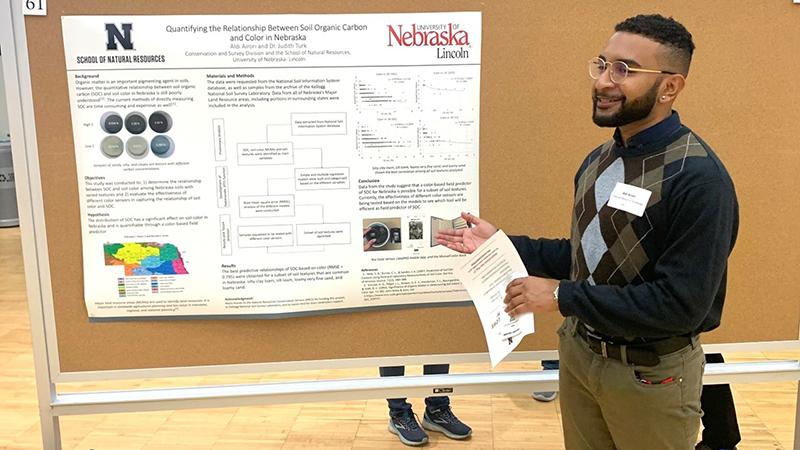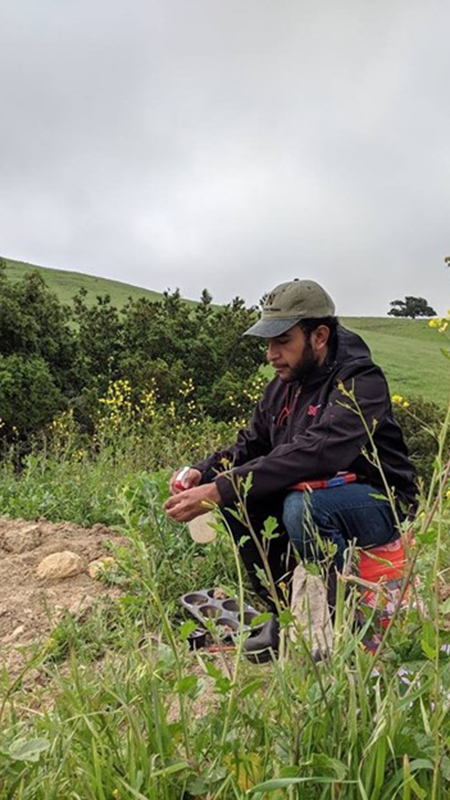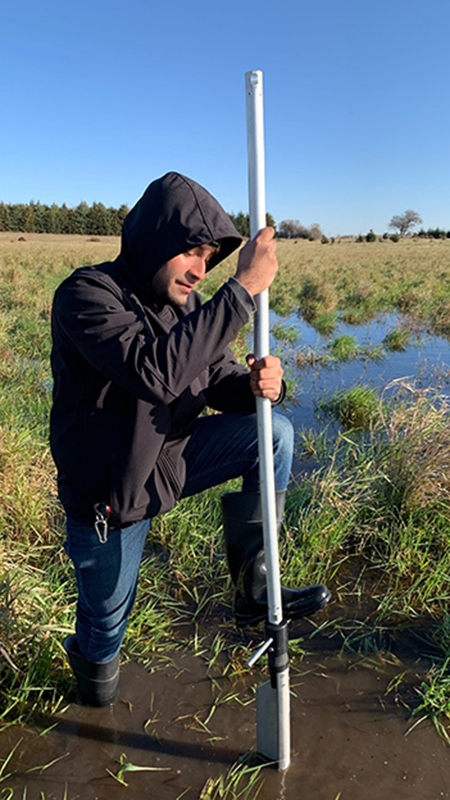Posted: 12/9/2022
Graduate Student Spotlight: Aldi Airori

Aldi Airori is the fourth of five siblings. He is from Papua which is found in the easternmost part of Indonesia. He came to the United States as an undergraduate in the University of Nebraska. His participation in the UCARE program as an undergraduate gave him the opportunity to author and publish a paper with his advisor.
Progression into graduate program was seamless for him but it was his passion for people that drove him into new frontiers. This culminated in him becoming the president of Graduate Students Association at the School of Natural Resources.
As he graduates this Fall of 2022 with a Master of Science in Natural Resource Sciences, Aldi shares his thoughts and experiences with the School of Natural Resources.
What prepared you for Graduate School here at UNL?
I'll say my undergraduate days gave me the needed start.
My bachelor's degree was in environmental science with a water science minor right here at SNR and graduated back in the fall of 2020.
My research exposure was unrivaled. It gave me the impetus for graduate school. I just knew what I wanted to do after I concluded the degree program.
I had entered several competitions which helped me dig deep to bring out the best in me. Competitions stretch you and expand your research capacity. .
I gave the UCARE (Undergraduate Creative Activities and Research Experience) program a shot and it was a beautiful exposure. Also, while working as a lab assistant during my second and third year, I gained the rudiments of lab operations. That exposure demystified the laboratory for me.
I have a philosophy on how I learn. You never go wrong by asking questions. That has always worked for me.
However, the major deciding influence was my advisor. She brought out the best in me. With little trials and successes, she trusted enough to allow me to participate in a study. I devoted time to it. Under her tutelage we got it published and my name appeared as the first author. The title of the research is "The Impact of Sampling Methodology on Soil Bulk Density Measurement by the Clod method."
Seeing that it was approved and published, I immediately set my eyes on the next challenge and couldn’t wait for the next opportunity to show up.

What is your specialization and how did you get to know about this master’s program, and how did you come about funding?
I am studying Natural Resource Sciences. I work with an amazing advisor/mentor Dr. Judith Turk whom I've been working with since my undergraduate year. I was fortunate to realize that faculty members are always looking for students with interest in research. My knack for research had already created a reputation for me and I thought that influenced the next opportunity which showed up. So, it was my advisor who mentioned during the summer of my final year that an opportunity would be available in the following year for funding a master’s student. I didn’t hesitate to grab it with both hands. I give a lot of credit to my advisor; she has an uncommon ability to spot talents.
What informed your course of study?
I grew up in Papua, an island in Indonesia with over 3 million people. There, I experienced challenges associated with climate change. Flooding was a common occurrence, and a lot of damages go unreported. Those were the days the idea was birthed that I could somehow be a part of the solution for my immediate society.
Secondly, my parents had always wanted me to study abroad and get the best education.
What role did your family play in this endeavor?
My parents are devout Christians; so, my four sisters and I were raised with the values of a regular Christian home. I am a follower of Christ myself. Hard work, love, and respect are virtues I easily emulated from my parents. Sadly though, I lost my father early this year. He has been a huge part of my success.
What was your thesis about?
My thesis was on the relationship between soil organic carbon and soil color in the State of Nebraska: evaluating digital color methods of measuring soil carbon and color.
How did you become President of the SNR Graduate Student Association?
Shortly after Covid, there was hardly anything going on among the graduate students. There was little reason to come together, and I could tell those other students had needs. But the avenue wasn’t there to talk about it. It was a different experience I had while I was an undergraduate because everything was provided back then.
In trying to help, I reached out to some personally. But that wasn’t sustainable. We needed more hands and a proper approach. We needed to stay organized. The only executive from the previous GSA offered some help. It went a long way as we eventually put some structure in place. It was quite easy to become the head because we were just restarting.
I am happy today at the shape of SNR GSA. All executive positions of the GSA have been filled and it’s running again as a fully registered RSO.

How easy was it for you to adapt regarding the culture? Was there any shock?
English isn't my first language. I spoke Bahasa back in Indonesia. English was only offered as a course, just the way French is offered here in the United States' public high schools. Very few people spoke fluent English because it wasn’t the official language.
On resuming classes here in UNL I bolstered my confidence by learning the language fast. I took two intensive English-learning courses. They helped a lot.
Also, I practiced on my own in the shower.
At other times, I hung around native speakers and didn’t hold back my mistakes. These were friends, and they took turns to highlight my errors. So, I improved.
Food?
My taste bud had to change completely. At first, I thought the meals were bland and tasteless. I was used to eating very spicy Nasi Goreng. It is stir-fried rice prepared differently from what I see here.
After years of being away from my traditional cuisine, I once again tried it during my recent trip to Jakarta. That was when I realized I couldn’t eat spicy meals anymore. It was as though I had flames in my mouth.
Now that you’re graduating, what’s next for you?
I'm still so consumed with my passion for research and will be looking for opportunities to continue expressing that passion. I’m applying to start a doctoral program. The focus will be soil carbon sequestration. That childhood dream is still very much alive. My dream is to work on the project somewhere in Siberia and the arctic region working with permafrost.
I’m also very open to getting a job.
I have 3 years for Optional Practical Training - OPT. But, if the admission comes in first, I’ll grab it and continue that trajectory. Recently, I had a taste of what being in academia felt like. I was the lead Learning Assistant at Professor Dauer's SCIL101 class. Where I led a recitation of 30 students.
What are some of your interests/hobbies?
I like working out, rock climbing, reading, painting, photography, and playing musical instruments. Fun fact - I know how to play three different musical instruments!
What advice do you have for incoming students?
Remember that life is filled with unexpected twists and turns, so go to that event, you just might be lucky. Show up. Run for that position, and say hi to people. You will feel uncomfortable at first but it's necessary for growth. You got this!
— by Jerome Okojokwu-Idu, SNR Grad student, and Emma Hazel, Recruitment and Retention Coordinator – SNR Graduate Programs